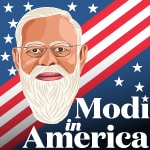Leaders of the United States, Japan, India and Australia have met together for the first time in person at the Quad summit and agreed to cooperate on such fields as COVID-19 vaccines, supply chains, clean energy and space. India is the winner from this meeting in two ways.
First, Prime Minister Narendra Modi continues to be treated like a “movie star” in the West and he set the calm tone for this meeting when he said Quad will be a “force for global good”. Second, India is the big winner, with Australia in second place, from the supply chain discussions, giving a major boost to India’s push for manufacturing.
The ramping up of the Quad grew out of a realisation among the four countries of their almost complete dependence on China for critically important supplies. The focus of the supply chains initiative is for India to be the major manufacturing hub, Australia to provide resources and skills training with the US and Japan providing technology innovations and the key element of investment. FDI (foreign direct investment) will increase in India as one indirect outcome of the Quad.
ALSO READ | Prime Minister Narendra Modi’s Big Message to US Industry—India is Open for Business
Australia becomes important to the Quad countries for future supplies of rare earth minerals, widely used in rechargeable batteries for cars and in phones, clean energy, superconductors, computers and more. Right now, China provides 80 per cent of the rare earth minerals on the globe.
Prime Minister Modi sent a strong signal of India’s non-alignment to the Quad when the week before the summit he attended the Shanghai Cooperation Organisation, which includes Russia, China, Iran, Pakistan and other central Asia countries. In short, Modi and India are not taking sides against China.
He spoke at the Quad with the authority of being the only member country that shares a land border with China. These four leaders have been energised by the growing influence of China, especially border clashes with India and trade bans on Australia.
This meeting is a reassuring sign that the Quad will not become another security and defence alliance—it can achieve more positive outcomes as a relatively loose grouping of countries with a shared interest.
The Quad also signalled President Biden’s global message that “America is back”, taking an activist role in Indo-Pacific diplomacy and deterrence of China. At the start of the meeting, Biden announced a fellowship programme to allow students from the four countries to pursue degrees in science, technology, engineering and mathematics (STEM) at US universities. This is American soft power of old back in action.
There has been movement on the security front, separate from the Quad. Earlier this month, the US, United Kingdom and Australia announced a new alliance, dubbed AUKUS. The media focus has been on nuclear powered—not nuclear armed —submarines for Australia. But a bigger outcome of AUKUS will see the position of Australia, at the physical centre of the Indo-Pacific region, become an active element of the increasing US and UK deployment of naval power to the region—navies need ports, supplies, and Australia is in the right spot.
The AUKUS deal came easy to the three countries who see the world through the prism of alignment—“us” versus “them”. India sees the world through non-alignment, experienced in dealing with competing powers and accepting that every country will be different and not all will be democracies.
I admire India—live and let live, not evangelical about democracy, keep the door open and accept differences. It is calm common sense when the world is set on polarisation. This view from India comes with the experience of being not just the world’s biggest democracy, but also the most resilient—India has over 22 major languages and hundreds of dialects, cultural differences and diversity, all united through democracy.
With the star status of Prime Minister Modi, India’s calming voice was apparent in Washington DC, and he is the leader for these times when too many are eager to beat the “drums of war”.
Australia has much at stake in the positive Quad outcomes, not the least being the opportunity to return to managing a balance of close trading partnership with China while being strategically aligned with the US and UK—it has done so before and with respectful diplomacy and calm negotiations, it can do so again.
For those in China who are rumoured to see both democracy and western economies “in terminal decline”, the Quad makes a strong statement of determination and success through quiet cooperation. If it continues on this path, the Quad will be one of the world’s major forces for rational, cooperative behaviour—all too rare in this emerging world order.
The author is blogger at INTO INDIA, former President Australia India Business Council (Vic) and Chairman of the Genesis India Australia Horticulture Project. The views expressed in this article are those of the author and do not represent the stand of this publication.
Read all the Latest News , Breaking News and Ukraine-Russia War Live Updates here.



